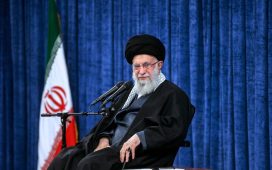UNITED NATIONS: Under pressure from Afghanistan’s Taliban administration, the United Nations is delivering some food aid using men only, prompting warnings from donors and humanitarian groups that it could be seen as giving in to an internationally condemned ban on most female aid workers.
UN aid chief Martin Griffiths acknowledged to reporters this week that women are not involved in some food aid activities, which the World Food Programme described as “operational adjustments” to allow it to continue its work, and he said the situation was inadequate.
“There are still activities that are ongoing where men-only (are), for example, delivering food, but it can’t work,” Griffiths said on Monday after he visited Afghanistan last week.
The issue illustrates a delicate balancing act facing the world body since the ban was imposed on Dec. 24: how to stand firm on women’s rights while finding ways to continue working in Afghanistan, where some 28 million people — two thirds of the population — need help, with six million on the brink of famine.
The Taliban, which seized power in August 2021 as US-led forces withdrew from Afghanistan after 20 years of war, says it respects women’s rights in accordance with its interpretation of Islamic law. It has since excluded women from parks, high school and university, and said women should not leave the home without a male relative and must cover their faces.
While women are still allowed to work for the United Nations, its operations are suffering because UN officials said 70 percent of the humanitarian response is implemented by local and international aid groups that are covered by the ban.
PRECEDENT TO REGRET
Any potential change to the UN approach to food aid following the ban has alarmed some donor nations and aid groups.
The United States — a key donor to aid efforts in Afghanistan — is concerned that some UN agencies may be considering an all-male aid delivery model, deputy US Ambassador to the United Nations, Lisa Carty, said on Wednesday during a briefing by Griffiths to UN member states.
“This could effectively cut off access to aid to women in need,” Carty said. “It could signal international agencies’ acquiescence to the Taliban’s unacceptable conditions thus normalizing the suppression with repercussions for humanitarian settings elsewhere.”
The International Rescue Committee said in an operational note on Wednesday that the role of women was “an operational necessity,” adding: “Without female staff at all levels and across all sectors, we cannot accurately assess needs and deliver aid and programs at the necessary scale.”
Griffiths stressed that Afghan women need to work in food aid distribution to ensure supplies reached the most vulnerable — women and girls.
“There’s absolute conviction that programs should all include women,” Griffiths said on Wednesday. “This may not be always needed in every single point of delivery, but they should include women, and even when they don’t there should be absolute clarity of reaching all members of society.”
The United Nations has appealed for $4.6 billion to fund the aid operation in Afghanistan in 2023. Griffiths said monitoring of programs would be ramped up to ensure they reach everyone.
“Aid delivery without participation of women cannot be normalized,” Deputy British UN Ambassador James Kariuki said.
When asked about the remarks Griffiths made on Monday, a WFP spokesperson said some changes had been made to operations after the ban was imposed.
“Where it is safe for them to do so, female partner staff continue to attend distributions and monitor assistance. Where needed, WFP has made operational adjustments to continue its life-saving assistance,” the spokesperson told Reuters.
The United Nations has managed to secure some health and education exemptions to the ban. Griffiths and the heads of some international aid groups met Taliban officials last week to push for more, including in the areas of cash and food aid distribution.
Norwegian Refugee Council Secretary General Jan Egeland, who was UN aid chief from 2003-06, said if any organizations started male-only aid delivery programs that would make it difficult for groups like NRC to stay. He said NRC had been forced to freeze its aid efforts until women can resume work.
“It sets a precedent in Afghanistan and in the wider world that we will live to regret,” he told Reuters. “The hard-liners would say ‘We won, we can do it without you’.”











